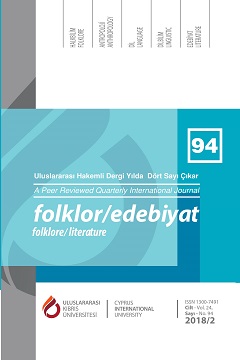Selamlaşma Bağlamında Üsküdar/Selami Ali Efendi Menkıbesinin Göstergebilim Açısından İncelenmesi
Examination of Üsküdar/Selami Ali Efendi Manqabat in Terms of Salutation in Terms of Semiotics
Author(s): Nursel UyanikerSubject(s): Semiology, Islam studies, 17th Century, Sociology of Religion, History of Religion
Published by: Uluslararası Kıbrıs Üniversitesi
Keywords: semiotics; onomasiology; Selami Ali Efendi; menkıbe; greeting;
Summary/Abstract: Selami Ali Efendi who lived in the 17th century, was a member of Aziz Mahmud Hüdâyî community, and the sheikh of one of the four major branches of Celvetî sect known as “Selamiyye”. The purpose of this study is to point out the significance of social conventions in Turkish-Islamic community by analyzing the legend of Selami Ali Efendi, the founder of “Selimiye”, one of the branches of Celvetiyye sect (known as Selamsız Sheikh), who gave his name to a street (Selami Ali, known as Selamsız) in Üsküdar. The study will be evaluated within the framework of onomasiology according to semiotics theory using literature text analysis method. Semiotics has offered analysis methods based on various concepts in order to reach and understand the deep structure of a text or discourse by moving from the surface structure. In this study, Selami Ali Efendi’s menqabat was analyzed by using analysis tools in the methodological analysis method developed by R. Barthes and A. J. Greimas. Analyzed within the context of onomasiology for this specific place starting from Turkish legend and menqabat, it can be suggested that the meaning of the place is connected to a spiritual cause by the given name.
Journal: Folklor/Edebiyat
- Issue Year: 24/2018
- Issue No: 94
- Page Range: 73-85
- Page Count: 13
- Language: Turkish

